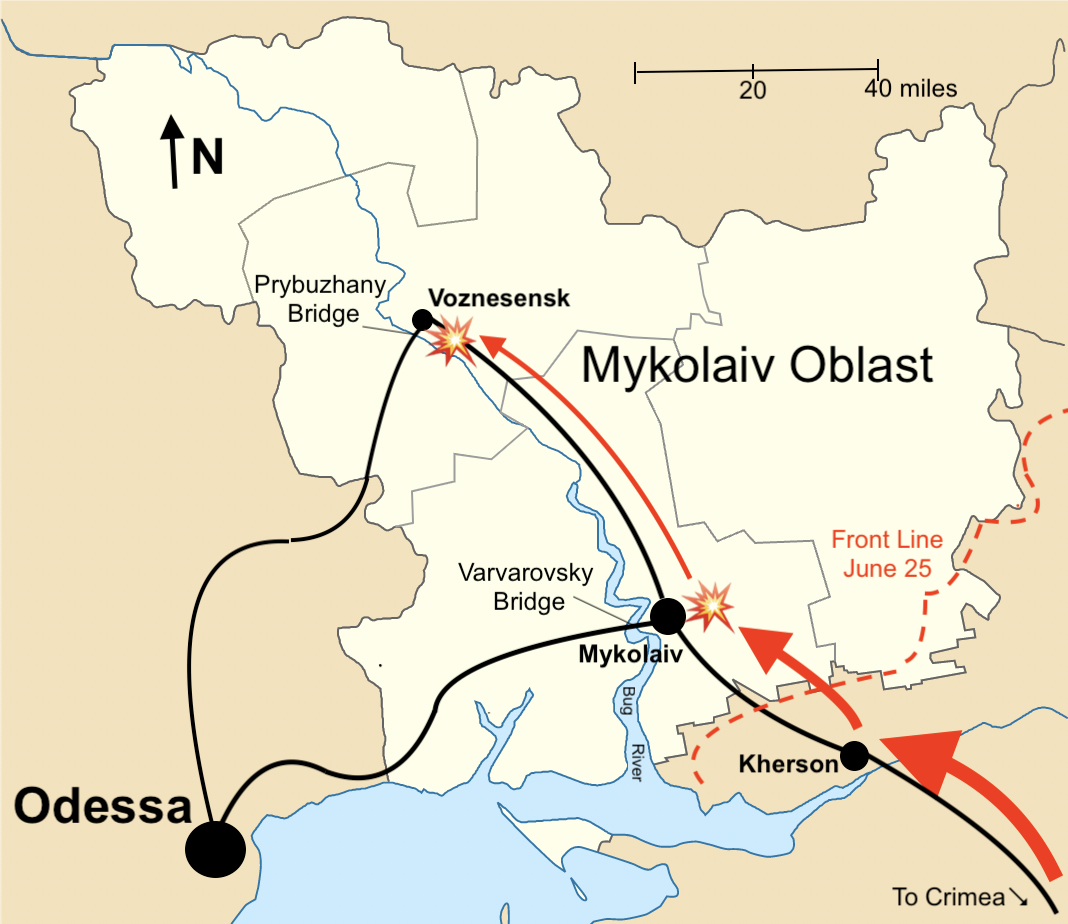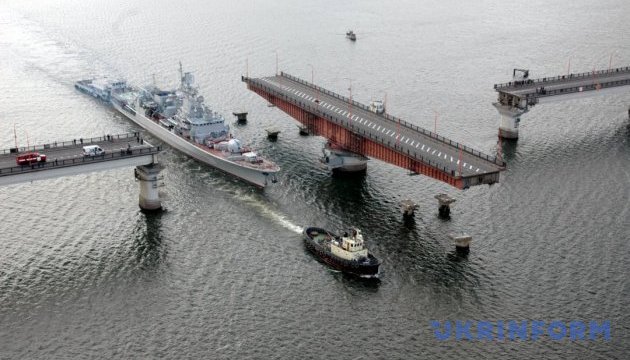|
Today's Opinions, Tomorrow's Reality
The Bridge to Odessa By David G. Young Washington, DC, June 28, 2022 -- Putin's dream of a New Russia stretching from Crimea to the port of Odessa shows little hope of coming true. While Ukrainian troops were famously repelling Russian paratroopers and tank columns outside on Kiev in late Februrary, a separate and much less known victory was taking place hundreds of miles to the south. On the first day of the war, Russian tank crews surged out of Crimea to surround the city of Kherson. Even before that city had fallen, some units moved northwest toward Mykolaiv and Voznesensk. These two cities are the sites of the southernmost vehicle bridges over the mighty Bug River, and therefore guard the approach to Odessa, the largest city on the Black Sea.
Over the next several days, while the world was focussed on the battles north of Kiev, Ukrainian forces in these cities repelled repeated attacks, pushing Russian forces back to the outskirts of Kherson where they remain to this day. While the battles were smaller than those raging near the capital, these Ukrainian victories proved decisive for keeping Odessa free. The Russians haven't tried to make another push for Odessa since early March, when things started going badly for their assault on Kiev. Now that the war is focussed on the Donbas, Ukrainian forces in Mykolaiv Oblast have been seizing the opportunity to push the front lines back toward Kherson. But Ukrainians in Mykolaiv and Odessa are hardly complacent. The fear, of course, is that if the Russians succeed in capturing all of Luhansk and Donetsk oblasts they may return their forces to the south and again try to push on for Mykolaiv and Odessa. To be sure, Mykolaiv is a prize in and of itself. It has one of the greatest shipyards of both the Russian Empire and the former Soviet Union, building aircraft carriers that serve three nations to this day. It was the origin of China's Liaoning aircraft carrier, India's Vakramaditya and Russia's Kuznetsov. The Nazis prized these same shipyards when they seized Mykolaiv in World War II. Back then, they partitioned the occupation of the country with the Romanians, drawing the border at the Bug River. At the time, the Nazis also had their attention on conquests further east. Today's Mykolaiv is in a good position to defend itself and the route to Odessa. The vast majority of it citizens, unlike those of Kherson, speak Ukrainian not Russian, giving it fewer candidates for collaboration than its occupied neighbor. And the one vehicle bridge over the Bug River toward Odessa is a swing bridge -- a bridge that can be held open to block tank columns from crossing without destroying the bridge itself.
Meanwhile, a repeat of February's mad dash for the next vehicle bridge at Voznesensk seems unlikely. Back then, Ukrainian forces had not yet mobilized against the Russian threat and the highway from Mykolaiv to Voznesensk was undefended. After the battles in early March, it's a good bet that won't happen again. This is great news for the people of Odessa, who appear relatively safe from Russian attacks for the foreseeable future. This is a big change from early February when the Russian navy captured Snake Island and was menacing Odessa port with surface ships, submarines, and missiles, and many feared an amphibious landing. But the sinking of the flagship Moskva largely ended fears of an attack by sea. Meanwhile, public attitudes in the city have moved greatly since 2014. Back then, relatively few Odessans expressed much Ukrainian nationalism. The city was founded by the Russian empire at the turn of the 19th century, and populated by not just Ukrainians, but by Russians, Jews, Bulgarians and Romanians. There were violent clashes between Russians and Ukrainians in 2014, but a secessionist movement never took hold in Odessa. Since then, Odessans have watched the same world news as the rest of us in the West, as they have witnessed Russian bullying starting in 2014 turned to violent atrocities in the 2022 invasion. This has effectively turned citizens of Odessa into patriotic Ukrainians regardless of ethnicity. Russians cannot expect a warm welcome if they do manage to cross the Bug river or make amphibious landings near the port. |



